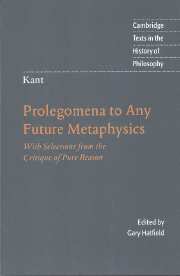Book contents
- Frontmatter
- Contents
- Acknowledgments
- Introduction
- Chronology
- Further reading
- Note on texts and translation
- Prolegomena to Any Future Metaphysics
- Selections from the Critique of Pure Reason
- Table of Contents for the Critique
- From the Preface to the Second Edition
- From the Introduction
- From the Transcendental Aesthetic
- From the Transcendental Logic, Introduction
- From the Transcendental Logic, First Division, Analytic
- From the Transcendental Logic, Second Division, Dialectic
- From the Transcendental Doctrine of Method
- Index
- Cambridge texts in the history of philosophy
From the Transcendental Aesthetic
Published online by Cambridge University Press: 05 June 2012
- Frontmatter
- Contents
- Acknowledgments
- Introduction
- Chronology
- Further reading
- Note on texts and translation
- Prolegomena to Any Future Metaphysics
- Selections from the Critique of Pure Reason
- Table of Contents for the Critique
- From the Preface to the Second Edition
- From the Introduction
- From the Transcendental Aesthetic
- From the Transcendental Logic, Introduction
- From the Transcendental Logic, First Division, Analytic
- From the Transcendental Logic, Second Division, Dialectic
- From the Transcendental Doctrine of Method
- Index
- Cambridge texts in the history of philosophy
Summary
In whatever manner and through whatever means a cognition may relate to objects, intuition is that by which it relates to objects immediately, and that toward which, as a means, all thought aims. But intuition takes place only insofar as the object is given to us; this in turn, however, is made possible (for us human beings at least) only through the object's affecting the mind in a specific manner. The capacity (receptivity) to obtain representations through the way in which we are affected by objects is called sensibility. By means of sensibility, therefore, objects are given to us, and it alone provides us with intuitions; but through the understanding objects are thought, and from it there arise concepts. All thinking, however, whether it do so directly (directe), or indirectly (indirecte), by means of certain characters, must ultimately relate to intuitions, and hence, for us, to sensibility, for no object can be given to us in any other way.
The effect of an object upon the capacity for representation, insofar as we are affected by that object, is sensation. The intuition that is related to the object through sensation is called empirical. The indeterminate object of an empirical intuition is called appearance.
Within appearance, that which corresponds to sensation I call the matter of appearance, but that which makes it that the multiplicity of appearance can be ordered in specific relations I call the form of appearance.
- Type
- Chapter
- Information
- Kant: Prolegomena to Any Future MetaphysicsWith Selections from the Critique of Pure Reason, pp. 161 - 165Publisher: Cambridge University PressPrint publication year: 1997



